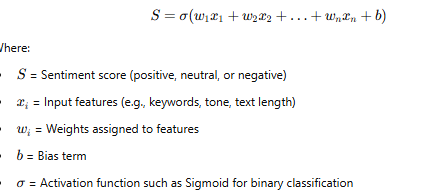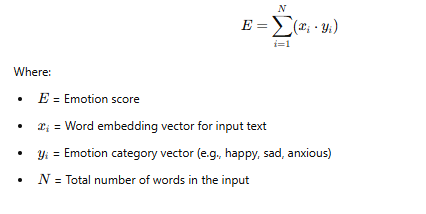AI-Enabled Chatbots for Cognitive Behavioral Therapy Support
 Chandrashekhar Pandugula
Chandrashekhar Pandugula
Introduction
Cognitive Behavioral Therapy (CBT) is a well-established psychological treatment that helps individuals manage mental health conditions such as anxiety, depression, and stress. While traditional face-to-face CBT sessions remain effective, there is a growing demand for scalable, accessible solutions that can provide support outside clinical environments. AI-enabled chatbots have emerged as an innovative tool to deliver CBT interventions, offering immediate, personalized, and cost-effective mental health support. This research explores how AI-enabled chatbots can enhance CBT support, their benefits, challenges, and future potential.
The Role of AI in CBT Support
AI chatbots use natural language processing (NLP) and machine learning algorithms to simulate human conversations. By integrating CBT principles into their framework, these chatbots can guide users through structured interventions, provide coping strategies, and track mental well-being.
sentiment Analysis Model (Text Classification

Key Features of AI Chatbots for CBT
Conversational Interface: Using NLP, chatbots engage users in text-based or voice conversations, mimicking human-like interactions to build rapport.
Personalization: Machine learning algorithms tailor responses based on user inputs, ensuring customized CBT guidance.
Psychoeducation: Chatbots provide educational resources about mental health conditions and coping strategies.
Mood Tracking: AI-driven mood-tracking tools help monitor emotional states and patterns over time.
Interactive Exercises: Chatbots offer CBT-based activities such as cognitive restructuring, behavioral activation, and mindfulness exercises.
Benefits of AI-Enabled Chatbots in CBT
1. Accessibility and Availability
AI chatbots provide 24/7 support, ensuring individuals can access mental health guidance anytime and anywhere. This reduces waiting times for professional therapy and supports those in remote areas.
2. Anonymity and Reduced Stigma
Many individuals experiencing mental health concerns avoid seeking professional help due to stigma. Chatbots provide a private and judgment-free platform for users to express themselves openly.
Chatbot Response Confidence Score

3. Cost-Effective Solution
AI-driven chatbots reduce healthcare costs by automating routine CBT guidance. Users receive immediate support without the need for frequent therapist visits.
4. Consistency and Reliability
Unlike human therapists, chatbots provide consistent responses and guidance, ensuring no information is overlooked or miscommunicated.
5. Data-Driven Insights
AI chatbots analyze user interactions, generating insights that help healthcare providers understand user behavior, mental states, and treatment progress.

How AI Chatbots Deliver CBT Techniques
AI chatbots are designed to deliver key CBT strategies through various conversational methods:
1. Cognitive Restructuring
Chatbots identify cognitive distortions such as negative thinking patterns. Through guided dialogue, they help users reframe irrational thoughts with healthier alternatives.
2. Behavioral Activation
AI chatbots encourage users to engage in positive activities that improve mood and reduce depressive symptoms. They provide reminders and motivational cues to ensure consistency.
3. Mindfulness and Relaxation Techniques
By guiding users through breathing exercises, meditation, and relaxation strategies, chatbots help reduce anxiety and promote mental calmness.
4. Goal Setting and Problem Solving
AI chatbots assist users in setting achievable goals, tracking progress, and suggesting practical steps to overcome obstacles.

Challenges in Implementing AI Chatbots for CBT
Despite their potential, AI-enabled chatbots face several challenges:
1. Emotional Understanding
AI chatbots often struggle to interpret complex emotions accurately. Subtle cues such as sarcasm, humor, or emotional intensity may be misinterpreted, limiting the bot's effectiveness.
2. Ethical Concerns and Privacy
Handling sensitive mental health data requires stringent privacy measures. Ensuring data security and obtaining informed consent are critical for ethical implementation.
3. Limited Scope
While chatbots excel at delivering structured CBT techniques, they may be ineffective for complex mental health conditions that require professional intervention.
4. User Engagement
Sustaining user engagement over time is challenging. Users may lose interest if chatbot interactions become repetitive or fail to address evolving concerns.
Emotion Recognition Model Using NLP

Future Directions and Innovations
To improve chatbot effectiveness in CBT support, several advancements are emerging:
1. Emotion AI Integration
Incorporating emotion recognition technology will enable chatbots to better understand user emotions, improving response accuracy and empathy.
2. Adaptive Learning Algorithms
AI models that adapt to individual user needs can improve personalization and tailor interventions more effectively.
3. Integration with Wearable Devices
Combining chatbots with wearable health monitors can provide real-time data on heart rate, sleep patterns, and stress levels, improving intervention timing.
4. Multimodal Interaction
Expanding chatbot capabilities to support voice, text, and video communication can enhance user engagement and accessibility.
5. Collaboration with Healthcare Professionals
AI chatbots can complement therapists by offering preliminary assessments, progress tracking, and automated follow-up support.

Conclusion
AI-enabled chatbots have the potential to revolutionize CBT support by providing accessible, personalized, and cost-effective mental health interventions. While these chatbots cannot replace professional therapy, they serve as valuable tools for early intervention, ongoing support, and crisis management. By advancing AI algorithms and integrating innovative features, AI-driven chatbots can play a significant role in improving global mental health outcomes.
Subscribe to my newsletter
Read articles from Chandrashekhar Pandugula directly inside your inbox. Subscribe to the newsletter, and don't miss out.
Written by
